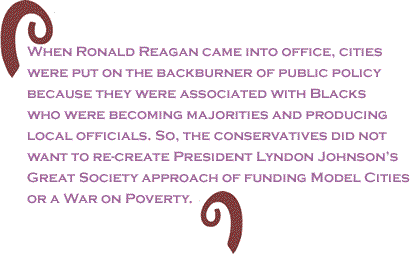There
are two bills in Congress now that could potentially put
considerable new resources into communities with high unemployment
around the country to create jobs. The first is the $118
billion bill, H. R. 4231, that is essentially designed to
extend unemployment insurance and provide tax incentives
to companies to create jobs. That is being put on the fast
track to pass before politicians leave for the recess in
June to campaign for re-election.
The second bill on the horizon however, is H. R. 4812 the
Local Job Creation Act, a more far reaching bill that is
the subject of a major effort by the Congressional Black
Caucus (CBC ) to get groups mobilized to support it. It
is an important piece of legislation because it sends funds
to localities targeted to places with high levels of unemployment
and poverty. A major recipient of such funding will be
local government, not state governments, and a unique recipient
will be non-profit community organizations that engage in
local job creation. The Leadership Conference on Civil
Rights recently sponsored a forum on Capitol Hill in collaboration
with the CBC that featured mayors and economists, but also
representatives of the unemployed, poor and homeless who
told their stories. It built a strong foundation for the
support of H.R. 4812.

The
importance of this legislative proposal is that it breaks
with 30 years of ineffective urban policy. When Ronald
Reagan came into office, cities were put on the backburner
of public policy because they were associated with Blacks
who were becoming majorities and producing local officials.
So, the conservatives did not want to re-create President
Lyndon Johnson’s Great Society approach of funding Model
Cities or a War on Poverty. Most of the money went to corporations
large and small, to train inner city residents and employ
them. In return, they became exempt from billions of dollars
of taxes for creating jobs in what became known as Empowerment
or Enterprise Zones. While Bill Clinton sent $100 million
to six big cities (Chicago, New York, Detroit, Los Angeles,
and Atlanta), businesses received $17 billion (2002-2009).
However,
in 2005 a critical study by Harvard University for the U.
S. Department of Commerce surveyed these programs and found
that they produced very little economic development in cities
that benefited disadvantaged populations. There has been
substantial agreement with its findings by researchers at
the Brookings Institution, the Urban Institute and other
authoritative organizations since 2005.

It
is time for the White House Office on Urban Affairs to go
back to what worked. Lyndon Johnson’s approach of direct
funding for job creation helped to create a new Black middle
class which cut the poverty rate from 50% in 1960 to 30%
by the end of that decade. But like any bill that has
the hint of spending money on people who need it most, the
Blue Dog Conservative Democrats are opposing it unless it
is paid for, that it means it must abide by the “pay-go”
rule. However, Rep. Barbara Lee, is leading the CBC in
trying to have this effort declared an “emergency” so that
it does not have to conform to the Pay-go rules.

Blacks
and others who live in the Congressional Districts of conservative
Democrats must finally challenge them. For example, I
previously have mentioned John Barrow, a leader of the
Blue Dog coalition in the House, whose district (Georgia
12) has a 45% Black population. But there are other Blue
Dog districts with over 30% Black population, such as: Jim
Marshall Georgia 13, John Spratt S Carolina 5, and Bob Etheridge
N Carolina 2. With these healthy Black populations, how
is it that they are unable to put pressure on these representatives
to support H. R. 4812?
This
legislation represents a prime target for all of those organizations,
the churches, Greek letter, civic and others who would become
active in helping the Black community to pull out of this
crisis, not only in the short term, but potentially in the
long run. The force of this struggle must be large enough
to break through the conservative strangle hold on human
needs public policy to show that there is a much larger
constituency for the pain being felt by most Americans right
now and that they do not privilege the size of the deficit
over that pain. They never have.
BlackCommentator.com Editorial Board member, Dr. Ron Walters,
PhD is a Political Analyst, Author and Professor Emeritus
of the University of Maryland, College Park.
His latest book is: The Price of Racial Reconciliation (The Politics of Race and Ethnicity) (University
of Michigan Press). Click here to
contact Dr. Walters. |

